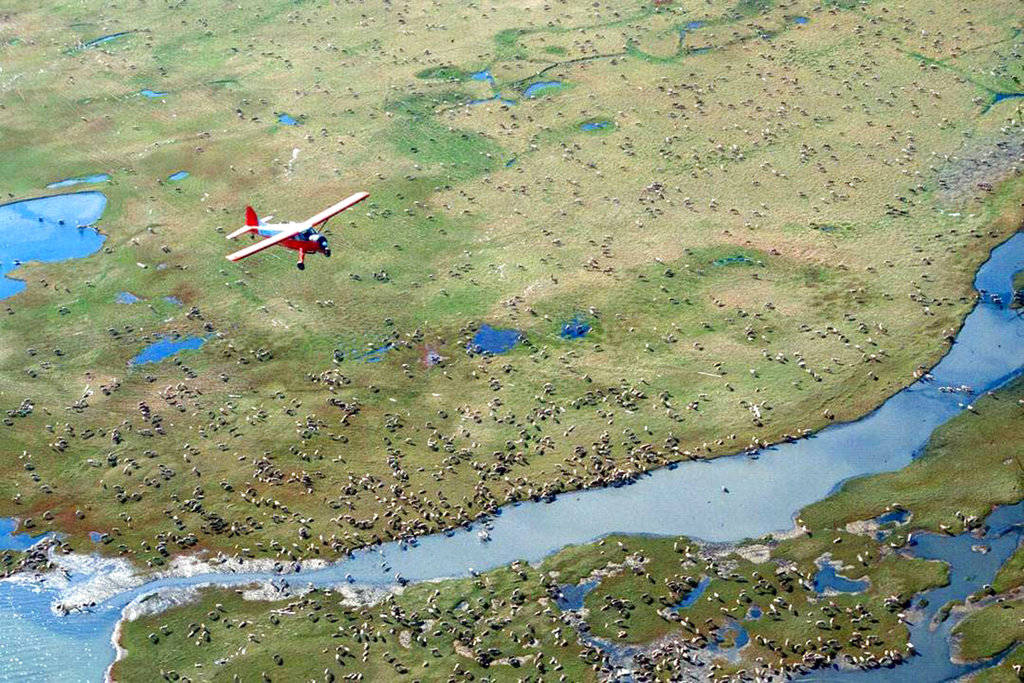Standing on the coastal plain of the Arctic National Wildlife Refuge some years back, I watched in wonder as tens of thousands of caribou, many with newborn calves, swept over the tundra. I listened as they splashed across a river, chanting grunts and bleats, their hooves clicking like castanets. A caribou symphony of life.
There is no other place in America so wild, so full of life and so free, as the Arctic Refuge. The area in the northeast corner of Alaska was set aside in 1960 by Republican President Dwight Eisenhower to permanently protect its “unique wildlife, wilderness and recreational values.”
In and near the Arctic Refuge, the Gwich’in Athabaskan Natives of Alaska and Canada still hunt caribou, as they have for thousands of years. Some 9,000 residents, in a dozen villages, continue to feed their families with caribou, tan the hides, make clothing, sing caribou songs and perform caribou dances. They refer to the coastal plain as Iizhik Gwats’an Gwandaii Goodlit, “The Sacred Place Where Life Begins.” The Gwich’in Athabaskan are united in their opposition to oil drilling on the coastal plain of the Arctic Refuge, the birthplace of the caribou that define their lives.
But politicians in Alaska and elsewhere want access to the Arctic National Wildlife Refuge in the name of oil, money and jobs. To this end, they are trying to circumvent the democratic process by slipping an Arctic Refuge drilling provision into tax reform legislation. A poll released earlier this year showed that two-thirds of Americans oppose efforts to allow gas and oil drilling in the refuge.
Ironically, the push to open this area to drilling is not led by the oil industry. Its sites are already set on the National Petroleum Reserve-Alaska, 100 miles to the west, where recent discoveries show promise. Blind to climate change, the Trump administration plans to hold the largest lease sale in the reserve’s history — more than 10 million acres are up for grabs. And Alaska is already developing millions of acres of state land that surround Prudhoe Bay.
In her push for oil development in the Arctic Refuge, Alaska’s Sen. Lisa Murkowski deceptively asserts that only 2,000 acres of the coastal plain would be developed if Congress opens the door to oil drilling. This sounds like one small postage stamp on a big, blank envelope.
But these 2,000 acres are not consolidated. They would be scattered over a much larger area, along with the accompanying drilling pads, settling ponds, garbage dumps and gravel pits — all connected by a web of roads and pipelines. Hundreds of oil spills come with this industrialization.
The unbroken wilderness of the Arctic Refuge, including the only sliver of Arctic coastline that is now protected, would be lost.
Must we sell off one of America’s greatest natural treasures? Where are the Republican leaders who, like Teddy Roosevelt, honor conservation and our precious natural heritage?
Congress has a clear choice. Members can honor the original purposes of the Arctic Refuge, protecting our wilderness and wildlife heritage for future generations, or vote to destroy our greatest refuge for a short-term budget fix and would-be fossil fuel revenues that may never materialize.
Debbie S. Miller, a longtime Alaskan and former school teacher in Arctic Village, is the author of “Midnight Wilderness: Journeys in Alaska’s Arctic National Wildlife Refuge (Braided River).” She resides in Sitka.

